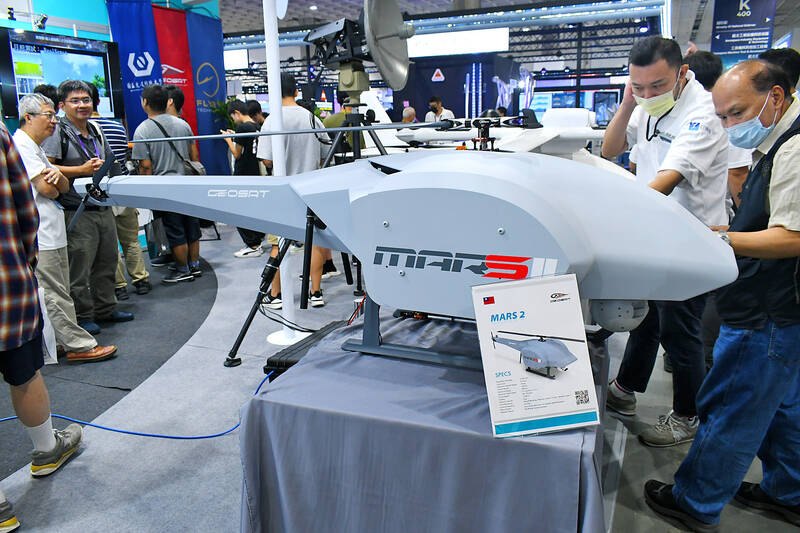Taiwan has signed an uncrewed aerial vehicle (UAV) development memorandum of understanding (MOU) with Arizona, the Ministry of Economic Affairs said yesterday.
The MOU was signed by Taiwan-USA Industrial Cooperation Promotion Office chief executive officer Jeff Lin (林昭憲) and Arizona-Taiwan Trade and Investment Office representative Steve Hsu (徐竹先) in Taipei on Monday, the ministry said in a statement.
Industrial Development Administration (IDA) Deputy Secretary-General Chen Pei-li (陳佩利) and Arizona Commerce Authority president and CEO Sandra Watson attended the signing ceremony, the ministry said.

Photo: Liu Yu-chieh, Taipei Times
The Russia-Ukraine war has drawn much global attention to the military use of drones, while the importance of civilian use of drones in communications, transportation and disaster relief has also gained importance, Chen said.
At a time when China accounts for 60 to 70 percent of the global commercial drone market, Taiwan and the US should work together to build a supply chain free from the Chinese Communist Party’s influence and ensure their national security, she said.
The IDA provides subsidies for the development of critical components for drones, including parts used in communications, payload capacity, flight control and artificial intelligence (AI) image recognition, the ministry said.
The IDA’s efforts aim to transform Taiwan into a drone supply hub and raise its status in the global economy, it said.
In addition, Taiwan opened the Asia UAV AI Innovation Application R&D Center in Chiayi County in August 2022 by integrating resources from more than 30 manufacturers for drone development, it said.
The cooperation with Arizona is expected to give additional technology support to Taiwan’s drone manufacturers, Chen said, adding that both sides would be able to take a larger share of the global drone market.
In April, the Industrial Technology Research Institute’s (ITRI) branch in North America signed an agreement with the center in Chiayi County, paving the way to drone development cooperation by taking advantage of ITRI’s resources in North America, Lin said.
The MOU signed on Monday would strengthen the partnership between Taiwan and Arizona, Lin said.
In addition to drone cooperation, Taiwan hopes to work with the US state in semiconductor equipment development, Chen said.
While Taiwan has built a strong pure-play wafer foundry services business, semiconductor equipment technology from the US has become an indispensable part of its success, she said.
As a result, Taiwan wants to reinforce cooperation in chip equipment development with the US, Chen said, adding that talent exchanges and training are expected to lay a good foundation.
Watson, who led a delegation to Taiwan for the MOU signing, said the US is looking forward to cooperating with Taiwan in drone and semiconductor development.
Taiwan Semiconductor Manufacturing Co (台積電), the world’s largest contract chipmaker, is building two advanced fabs in Arizona and plans to build a third one there, with investments in the US state expected to top US$65 billion.

AIR SUPPORT: The Ministry of National Defense thanked the US for the delivery, adding that it was an indicator of the White House’s commitment to the Taiwan Relations Act Deputy Minister of National Defense Po Horng-huei (柏鴻輝) and Representative to the US Alexander Yui on Friday attended a delivery ceremony for the first of Taiwan’s long-awaited 66 F-16C/D Block 70 jets at a Lockheed Martin Corp factory in Greenville, South Carolina. “We are so proud to be the global home of the F-16 and to support Taiwan’s air defense capabilities,” US Representative William Timmons wrote on X, alongside a photograph of Taiwanese and US officials at the event. The F-16C/D Block 70 jets Taiwan ordered have the same capabilities as aircraft that had been upgraded to F-16Vs. The batch of Lockheed Martin

GRIDLOCK: The National Fire Agency’s Special Search and Rescue team is on standby to travel to the countries to help out with the rescue effort A powerful earthquake rocked Myanmar and neighboring Thailand yesterday, killing at least three people in Bangkok and burying dozens when a high-rise building under construction collapsed. Footage shared on social media from Myanmar’s second-largest city showed widespread destruction, raising fears that many were trapped under the rubble or killed. The magnitude 7.7 earthquake, with an epicenter near Mandalay in Myanmar, struck at midday and was followed by a strong magnitude 6.4 aftershock. The extent of death, injury and destruction — especially in Myanmar, which is embroiled in a civil war and where information is tightly controlled at the best of times —

China's military today said it began joint army, navy and rocket force exercises around Taiwan to "serve as a stern warning and powerful deterrent against Taiwanese independence," calling President William Lai (賴清德) a "parasite." The exercises come after Lai called Beijing a "foreign hostile force" last month. More than 10 Chinese military ships approached close to Taiwan's 24 nautical mile (44.4km) contiguous zone this morning and Taiwan sent its own warships to respond, two senior Taiwanese officials said. Taiwan has not yet detected any live fire by the Chinese military so far, one of the officials said. The drills took place after US Secretary

THUGGISH BEHAVIOR: Encouraging people to report independence supporters is another intimidation tactic that threatens cross-strait peace, the state department said China setting up an online system for reporting “Taiwanese independence” advocates is an “irresponsible and reprehensible” act, a US government spokesperson said on Friday. “China’s call for private individuals to report on alleged ‘persecution or suppression’ by supposed ‘Taiwan independence henchmen and accomplices’ is irresponsible and reprehensible,” an unnamed US Department of State spokesperson told the Central News Agency in an e-mail. The move is part of Beijing’s “intimidation campaign” against Taiwan and its supporters, and is “threatening free speech around the world, destabilizing the Indo-Pacific region, and deliberately eroding the cross-strait status quo,” the spokesperson said. The Chinese Communist Party’s “threats